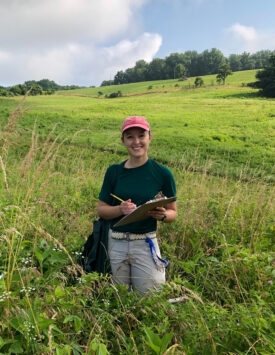Dr. Jordan Coscia
IGC FELLOW GRADUATE | Global Change Center
VT GRADUATE May 2025 • School of Plant and Environmental Sciences
Research Interests: Grassland ecology, community ecology, ecological restoration, botany
Advisor: Dr. Leighton Reid
jtcoscia@vt.edu

Jordan successfully defended their dissertation in April of 2025.
Jordan began their PhD under the mentorship of Dr. Leighton Reid in the School of Plant and Environmental Sciences in 2020. Their research on the conservation and restoration of grasslands in the American Southeast began with an internship at the Smithsonian Conservation Biology Institute’s Virginia Working Landscapes program (VWL), which they started shortly after graduating for the University of Pittsburgh in 2019. At VWL, Jordan lead baseline vegetation surveys for an experimental grassland restoration project that would become a central part of their proposed dissertation research. Upon their acceptance to Tech, Jordan developed their internship with VWL into a Smithsonian Fellowship, where they continue to conduct collaborative research with the Oak Spring Garden Foundation, the Clifton Institute, the Piedmont Discovery Center, and VWL’s network of landowners, researchers, and citizen scientists.
Jordan’s dissertation research focused on the floristics, conservation, and restoration of southeastern grasslands, one of the most endemic-species-rich ecosystems in North America. They surveyed remnant, semi-natural, and working grasslands in northern and central Virginia to describe the floristic composition of native Piedmont grasslands and assess the conservation value of working and restored grasslands. They also conducted a restoration experiment to determine the barriers to natural grassland regeneration in Virginia by comparing the impacts of active and passive restoration techniques on native grassland communities, and assessed the impacts of 25 years of land management on the plant community of Big Meadows in Shenandoah National Park.
Jordan believes that though humankind has a complicated history of negative impact on the natural world, people can help guide the Earth’s recovery through collaboration and innovation. They aim to develop an interdisciplinary career that combines restoration ecology with human needs such as sustainable agriculture so that they may simultaneously contribute to the welfare of both people and wildlife.
Last updated June 2025.


